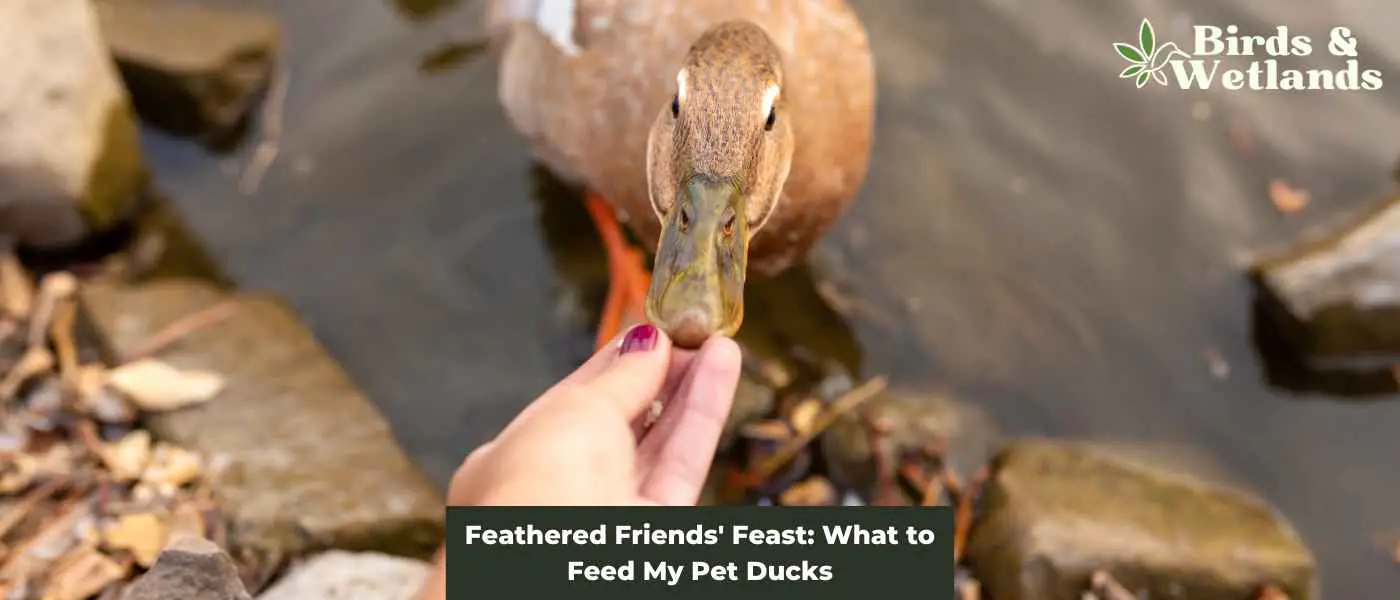From scrumptious treats to nutritious meals, we’ll dive into the ins and outs of what makes a duck’s taste buds sing, while ensuring their well-being.
So, let’s flap our wings, grab our aprons, and discover what to feed pet ducks
To ensure the health and well-being of your pet ducks, provide a balanced diet consisting of commercial duck feed, vegetables, and grains. High-quality duck pellets or crumbles, specifically formulated for ducks, should be their primary food source. Supplement with leafy greens, peas, corn, oats, and chopped fruits for variety and additional nutrients.
Key Takeaways:
- A balanced diet is crucial for pet ducks’ health and well-being
- Provide high-quality commercial duck feed, such as pellets or crumbles
- Supplement with vegetables, grains, and fruits for variety and extra nutrients
Understanding Ducks’ Nutritional Needs
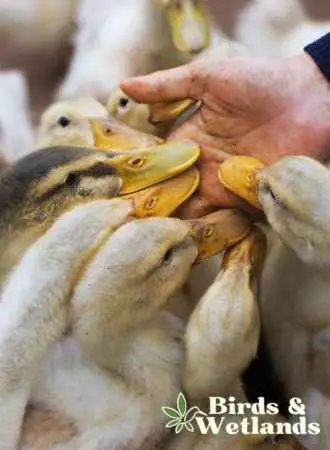
Ducks, like any other living beings, require a balanced diet to maintain their health and well-being. A balanced diet for ducks should consist of protein, carbohydrates, vitamins, and minerals. Understanding these nutritional needs is essential for keeping your pet ducks healthy and happy.
Protein
Protein is an essential nutrient for ducks as it helps them build and repair muscles, feathers, and other tissues. Ducks require a diet that contains approximately 16-17% protein to meet their needs. Good sources of protein for ducks include:
- Commercial duck feed
- Chick feed
- Layer feed
- Mealworms
- Small fish
- Fish eggs

Black Larvae
High Nutritional Value: Rich in protein, calcium, and other essential nutrients.
Boosts Calcium Intake: With 50-75 times more calcium than mealworms

UCM Dried Mealworms
Nutrient-Dense: Packed with essential vitamins and minerals.
High Protein Content: With 53% protein,
Carbohydrates

Carbohydrates are an essential source of energy for ducks. They should make up the majority of a duck’s diet. Good sources of carbohydrates for ducks include:
- Cracked corn
- Rolled oats
- Mixed grain
- Seed heads
Vitamins and Minerals
Ducks require vitamins and minerals to maintain their overall health and well-being. A balanced diet for ducks should contain:
- Leafy greens
- Zucchini
- Peas
- Corn
- Non-citrus fruits
- Crushed oyster shell
- Brewers yeast
It is important to note that ducks should not be fed too much bread, as it is not a nutritious food for them. Additionally, ducks should be provided with fresh water at all times.
Best Duck Feed Pellets
Are you a duck owner looking for the perfect feed to keep your feathered friends happy and healthy? Look no further than Purina Duck Feed Pellets! With their nutritionally balanced formula and high-quality ingredients, these pellets are the ultimate solution for providing your ducks with the nutrition they need to thrive.
Pros
- Complete Nutrition: Purina Duck Feed Pellets are nutritionally balanced to provide all the essential vitamins and minerals that ducks need to stay healthy and strong.
- Easy to Digest: The pellets are specially formulated to be easy to digest, which makes them ideal for ducks of all ages.
- Promotes Growth and Development: With its balanced nutrition formula, Purina Duck Feed Pellets are designed to support healthy growth and development in ducks.
- Suitable for All Breeds: Whether you have domestic ducks or wild ducks, Purina Duck Feed Pellets are suitable for all breeds of ducks.
- Trusted Quality: Purina has been producing high-quality animal feed for over 100 years, so you can trust that your ducks are getting the best possible nutrition with Purina Duck Feed Pellets.
Cons
- Cost: Compared to other types of duck feed on the market, Purina Duck Feed Pellets can be slightly more expensive. However, many customers feel that the high-quality ingredients and balanced nutrition formula are worth the extra investment.
- Pellet Size: Some customers have noted that the pellet size of Purina Duck Feed Pellets can be quite large, which may not be suitable for smaller or younger ducks. However, many customers have reported that the pellets can easily be broken up or soaked in water to make them easier to eat.
Occasional Treats
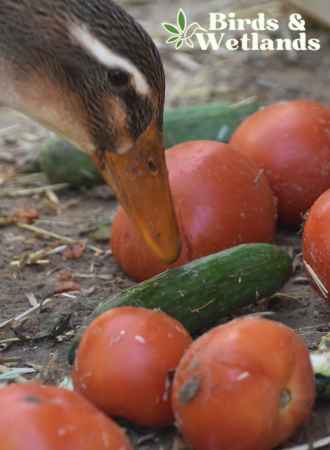
While a balanced diet is essential for ducks, they can also enjoy occasional treats. Good treats for ducks include:
- Frozen peas
- Stale bread
- Small amounts of fruits and vegetables
It is important to note that treats should not make up a significant portion of a duck’s diet, as they can lead to obesity and other health problems.
Understanding ducks’ nutritional needs is essential for keeping them healthy and happy. Ducks require a balanced diet that consists of protein, carbohydrates, vitamins, and minerals. A balanced diet, fresh water, and occasional treats will help keep your pet ducks healthy and happy.
Choosing the Right Food for Your Ducks
When it comes to feeding your pet ducks, it’s important to choose the right food to ensure their health and well-being. Here are some options to consider:
Commercial Duck Feed
Commercial duck feed is a great option for pet ducks because it is specifically formulated to meet their nutritional needs. It is available at most local feed stores and can be purchased in pellet or crumble form. It typically contains a balanced mix of protein, vitamins, and minerals.
When choosing commercial duck feed, it’s important to select a product that is appropriate for your duck’s age and activity level. For example, ducklings require a higher protein content than adult ducks, so make sure to choose a starter feed for them.
Best Waterfowl Feed
Delightful Feeding Experience
Transform your backyard into a scenic waterfowl habitat and enjoy an interactive feeding experience with Natural Waterscapes Waterfowl Floating Food.

Pros
- Nutritious Food: Natural Waterscapes Waterfowl Floating Food is specifically designed to provide essential nutrients to waterfowl, including swans, geese, and ducks, helping them maintain a healthy diet.
- Convenient: The food comes in resealable packaging, making it easy to store and use as needed. It is also easy to handle and transport.
- Floating Formula: The floating formula of the food allows it to remain on the surface of the water, making it easier for waterfowl to eat and minimizing the risk of water contamination.
- Attracts Waterfowl: The food is formulated to attract various waterfowl species, including swans, geese, and ducks, to your pond, lake, or other water body, providing an opportunity to observe and enjoy these beautiful creatures.
- Environmentally Friendly: Natural Waterscapes Waterfowl Floating Food is made with environmentally friendly ingredients and does not contain any harmful preservatives, making it safe for both waterfowl and the environment.
Cons
- Shelf Life: The food’s shelf life may be limited compared to other types of waterfowl food due to its natural ingredients and lack of preservatives. This means you may need to use it up quickly after opening the package to prevent it from going bad.
Supplements and Treats
Supplements and treats can be a great addition to your duck’s diet, but they should not make up the majority of their food intake. Some good options include fresh fruits and vegetables, such as peas, leafy greens, and corn. Ducks also enjoy protein-rich treats like mealworms and crickets.
It’s important to note that junk food, such as bread and chips, should be avoided as they offer little nutritional value and can lead to health problems in the long run.
Homemade Duck Feed
If you prefer to make your own duck feed, there are several recipes available online that can provide a balanced mix of nutrients. However, it’s important to ensure that your homemade feed contains all the necessary vitamins and minerals that your duck needs.
One popular homemade duck feed recipe includes a mix of grains, such as wheat, corn, and barley, along with fish meal and soybean meal. It’s important to note that homemade feed may not be as nutritionally complete as commercial feed, so it’s a good idea to consult with a veterinarian to ensure that your duck is getting all the necessary nutrients.
Choosing the right food for your pet ducks is essential for their health and well-being. Commercial duck feed is a great option, but supplements and homemade feed can also be added to their diet in moderation. By providing your ducks with a balanced diet, you can help ensure that they live a healthy and happy life.
Feeding Your Ducks – Domestic duck food
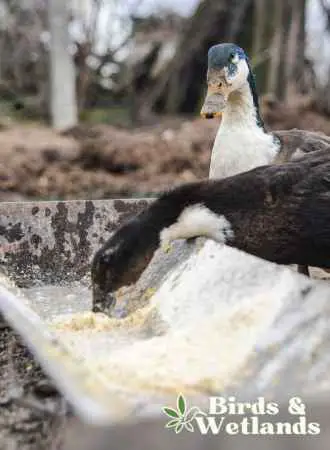
When it comes to feeding your pet ducks, it’s important to ensure they are getting the proper nutrition to maintain their health and well-being, with a diet similar to a wild ducks diet. Here are some tips on feeding your ducks:
Feeding Frequency
Ducks should be fed at least once a day, but you can also provide them with smaller meals throughout the day. It’s important not to overfeed your ducks, as this can lead to obesity and other health issues.
Feeding Quantity
The amount of food your ducks need will depend on their age, size, and activity level. As a general rule, ducks should be fed about 1/4 to 1/2 cup of food per day. However, this amount may need to be adjusted based on your individual ducks’ needs.
Feeding Schedule
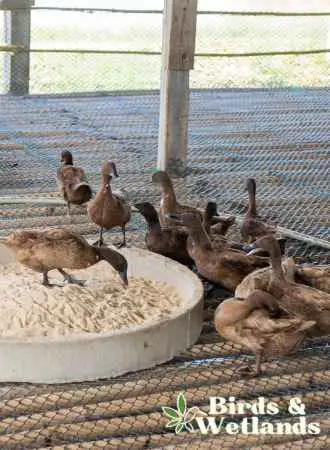
It’s a good idea to establish a feeding schedule for your ducks. This will help ensure they are getting the proper nutrition and will also help prevent overfeeding. You can feed your ducks in the morning and evening, or at other times that work best for you and your ducks’ schedule.
When it comes to what to feed your ducks, there are several options. Ducks love to eat a variety of foods, including:
- Commercial duck feed: This is a specially formulated feed that provides all the necessary nutrients for your ducks’ diet. Look for a feed that is high in protein and contains added vitamins and minerals. You can also use chicken feed for your backyard ducks.
- Vegetables: Ducks love to eat vegetables such as lettuce, kale, and spinach. These can be given as a treat in addition to their regular feed.
- Fruits: Ducks also enjoy fruits such as berries, melons, and apples. Again, these should be given as a treat in addition to their regular feed, the same when you feed wild ducks.
It’s important to avoid feeding your ducks foods that are harmful to them. This includes foods that are high in salt, sugar, or fat, as well as foods that are toxic to ducks such as avocado, chocolate, and caffeine.
Feeding your ducks a balanced diet of commercial duck feed, vegetables, and fruits will help ensure they are healthy and happy.
Best Overall Duck Feeder -FeatherEase Automatic Chicken Waterer & Feeder
Simplify Your Poultry Care with One Smart Solution!
Enhance your poultry care with the FeatherEase Automatic Chicken Waterer & Feeder, a convenient and efficient solution designed to keep your ducks and chickens well-fed and hydrated.

Pros
- Simplify your poultry care routine: Dual-function design combines an automatic waterer and feeder in one convenient unit.
- Save time and effort: Large feeder and waterer capacities reduce the need for frequent refill.
- Save money: Innovative no-waste feeding system minimizes feed spillage and waste.
- Long lasting: Food-grade, BPA-free materials ensure the safety and health of your poultry, while the durable constructio.
- Easy-to-assemble and maintain design simplifies the process of keeping your poultry hydrated and well-fed.
Cons
- Users with hard water may experience difficulty in separating the inner cup from the main cup of the waterer due to mineral buildup.
- The feeder’s holes may be too large for some users, allowing chickens to scatter food out, which could result in waste.
- The waterer may not function effectively in colder climates, requiring alternative solutions during the winter months.
Special Considerations for Different Stages of Life
When it comes to feeding pet ducks, different stages of life require different nutritional needs. Here are some special considerations for each stage:
Ducklings
During the first two weeks of their lives, ducklings require a diet high in protein and nutrients to support their rapid growth. According to For The Birds DVM, ducklings should be fed a starter feed with a protein content of 18-20%. This feed should be available to them at all times.
As they grow, ducklings can be transitioned to a grower feed with a slightly lower protein content (16-18%). They should also have access to clean water for drinking and swimming.
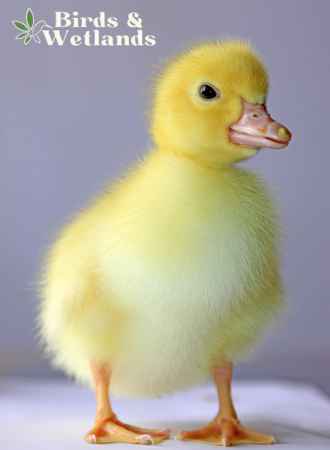
Non-Laying Ducks
For ducks that are not laying eggs, a maintainer feed with a protein content of around 15-16% is appropriate. According to Tyrant Farms, male ducks should always be fed a maintainer feed, while female ducks can be fed a layer feed when they are laying eggs.
It’s important to provide ducks with access to clean water for drinking and swimming. A waterer for chickens can work well for ducks as well.
Laying Ducks
A female Duck that is laying eggs requires a diet with a higher calcium content to support egg production. Layer feed with a protein content of around 16-18% and a calcium content of 3-4% is appropriate for laying ducks.
In addition to layer feed, ducks should have access to clean water for drinking and swimming. It’s also important to provide them with access to a nesting box or other suitable area for laying eggs just like wild birds.
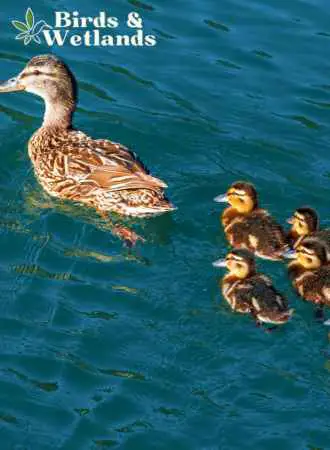
Molting Ducks
When ducks go through a molting period, they may stop laying eggs and require a different diet. During this time, a maintainer or grower feed with a slightly higher protein content (around 16-18%) can be appropriate.
It’s important to continue providing ducks with access to clean water for drinking and swimming during the molting period.
It’s important to provide pet ducks with a balanced diet appropriate for their stage of life. Ducks should have access to clean water for drinking and swimming at all times. Avoid feeding ducks foods that are harmful to their health, such as bread, chocolate, onion, garlic, popcorn, avocados, and citrus fruits.
Maintaining Your Ducks’ Health
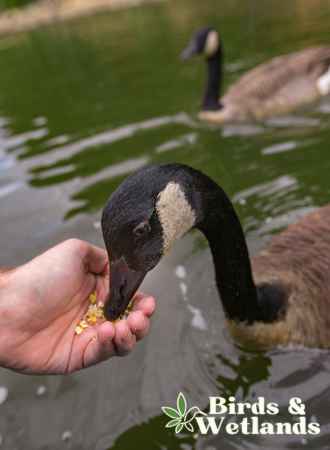
When it comes to keeping your pet ducks healthy, their diet is just one aspect to consider and should be similar to what wild ducks eat. In addition to feeding them a balanced diet, it’s important to ensure they have access to clean water, prevent nutritional deficiencies, and avoid issues like obesity and malnutrition.
Hydration and Clean Water
One of the most important things to prioritize is making sure your ducks are properly hydrated and have access to clean water. Ducks need a lot of water to stay healthy, and it’s important to change their water frequently to prevent the growth of harmful bacteria.
In addition to changing their water regularly, it’s a good idea to invest in a quality waterer that can help keep their water clean and fresh. Look for a waterer that is easy to clean and refill, and consider adding a small amount of apple cider vinegar to the water to help prevent the growth of bacteria.
Preventing Nutritional Deficiencies
To prevent nutritional deficiencies in your ducks, it’s important to feed them a balanced diet that includes a variety of nutrients. Ducks need a diet that is high in protein, but too much protein can be harmful to their health. It’s also important to avoid feeding them too much bread, as this can lead to nutritional deficiencies.
When ducks eat bread, they are consuming a high-carbohydrate food with little nutritional value. Feeding ducks bread can lead to several health problems, such as obesity, malnutrition, and even a condition called “angel wing,” which causes the wing joints to develop incorrectly.
To maintain proper nutrition when you are raising ducks, provide them with a high-quality, ducks food that is formulated to meet their dietary needs. This feed should be the primary source of their nutrition.
You can also supplement their diet with appropriate treats, such as leafy greens, meal worms (available from your local feed store), chopped vegetables, and insects or worms. Remember to introduce new foods gradually and monitor your ducks’ health to ensure they are receiving the proper nutrients.
To ensure your ducks are getting the nutrients they need, consider adding crushed oyster shell to their diet. This can help provide them with calcium, which is essential for healthy egg production. You can also add rolled oats to their diet to provide them with additional fiber and nutrients.
Preventing Obesity and Malnutrition
Finally, it’s important to prevent issues like obesity and malnutrition in your ducks. To prevent obesity, it’s important to avoid feeding your ducks too many treats or table scraps. Instead, focus on providing them with a balanced diet that includes plenty of fresh fruits and vegetables.
To prevent malnutrition, it’s important to make sure your ducks are getting enough protein and other essential nutrients. Consider adding frozen peas to their diet, as these are a great source of protein and other important nutrients.
Maintaining your ducks’ health requires a combination of a healthy diet, clean water, and proper hydration. By following these tips and providing your ducks with a balanced diet, you can help ensure they stay healthy and happy for years to come.
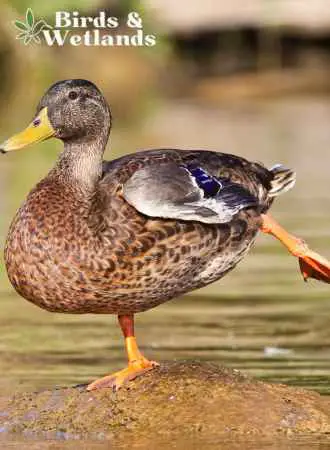
FAQS on Domestic Duck Food
What do backyard ducks eat?
Backyard ducks typically eat a balanced diet consisting of commercial duck feed, which is specially formulated to meet their nutritional needs. This diet can be supplemented with fresh vegetables, leafy greens, small insects or worms, and occasional fruits.
Can ducks eat chicken feed?
It is not recommended to feed ducks chicken feed, as it may not provide the specific nutrients ducks require. Ducks need more niacin than chickens, and a lack of niacin can lead to growth and health issues. Instead, choose a duck-specific feed that is designed to meet their nutritional needs.
What do domestic ducks eat in the wild?
In the wild, domestic ducks or their wild counterparts consume a varied diet, which includes aquatic plants, seeds, small fish, insects, and other small aquatic creatures. Dabbling ducks primarily feed on plant material, while diving ducks may have a diet that includes more small fish and underwater vegetation.
What should you not feed pet ducks?
Some foods should be avoided when feeding pet ducks, as they can cause health issues or provide little nutritional value. These foods include:
- Bread, crackers, or pastries
- Salty or sugary snacks
- Citrus fruits
- Processed human foods
- Avocado, as it is toxic to ducks
- Chocolate or foods containing caffeine
- Moldy or spoiled food
How often should I feed my pet duck?
Pet ducks should have access to food throughout the day, so they can eat as needed. This can be achieved by providing a feeder with a constant supply of duck feed. Fresh vegetables and treats should be given in moderation and not replace the nutritionally complete duck feed. Make sure your ducks have access to clean water at all times for drinking and cleaning their bills.

